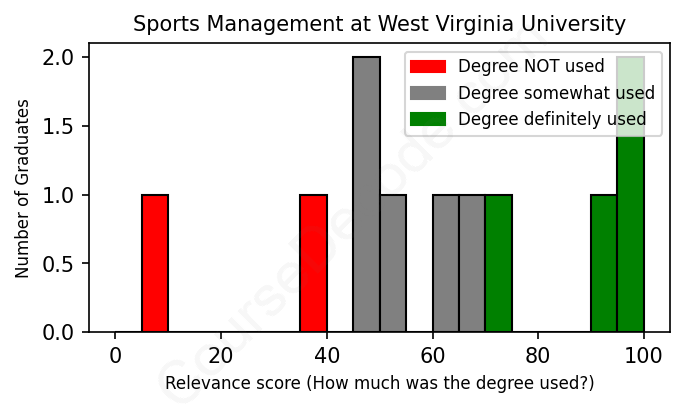
First, some facts. Of the Sports Management graduates from West Virginia University we've analyzed , here's how many have used (or NOT used) their degree in their career:

These are estimates based on AI analysis of 11 LinkedIn profiles (see below).
The verdict? Below average. Overall, with an average relevance score of 61%, Sports Management graduates from West Virginia University have a lower likelihood (-6%) of finding work in this field compared to the average graduate across all fields:
And for comparison, here's the chart for all profiles we've looked at across all degrees.
Also, after graduating, only 27% of these graduates have pursued further education other than another Bachelor's degree (such as a Masters degree or other), compared to the average across all profiles of 35%. This suggests a Bachelors degree is enough for most Sports Management graduates, and it's normal to look for work straight after graduation.
See the details:
|
Relevance score: 60% We think this person has gone into a career only somewhat relevant to their degree. We think this person has gone into a career only somewhat relevant to their degree.
DEGREE INFOGraduated in 2020 from West Virginia University with a Bachelor's degree in Sports Management. Also pursued further education since (see below). JOB HISTORY SINCE GRADUATIONResolution Specialist Teleperformance Oct 2020 - Nov 2021 Emergency Roadside Service  AAA Nov 2021 - Jun 2022 Front Desk  The Bridge Sports Complex Jul 2022 - Oct 2022 Front Desk Lead/Event Operations  The Bridge Sports Complex Oct 2022 - Jul 2023 Sports Facility Coordinator  The Bridge Sports Complex Jul 2023 - Present FURTHER DEGREES DONE SINCE GRADUATINGMaster's degreeWest Virginia University 2020 - 2022 ABOUTBeing part of a successful sports organization and playing an important role in that success is one of my short term career goals, and any experience and opportunity to help me get there is very valuable to me. 2022 Graduate of the Sport Management Masters program at West Virginia University currently employed at a state-of-the-art sports recreation complex (The Bridge Sports Complex).Past experiences in sports includes internships with the West Virginia Black Bears MiLB team in marketing/merchandising and Fairmont State University Athletics as game day operations (Division II football). Skills in Microsoft Office, Adobe Creative Cloud, and various other computer applications. Communication, customer service, reading, writing, problem solving, and critical thinking are also among my strengths. I communicate well with others and I can be an effective group member. |
The top 10 most common jobs done by the graduates we've analyzed (ranked most common to least) are:
After looking at the job trajectories of people who graduated with a Sports Management degree from West Virginia University, it seems like there's a bit of a mixed bag regarding how closely their jobs are related to sports management. One of the more common roles for these graduates is in the sports operations and event management sector, like those who worked as Operations Interns or Sports Coordinators. These positions leverage the skills learned in their degree, touching on teamwork, organization, and event logistics, which are foundational elements of sports management.
However, quite a few graduates found themselves in roles that are not very connected to sports at all, jumping into jobs in sales, customer service, or even unrelated areas like education. For instance, jobs like Account Executive for ticket sales were a good fit because they directly apply sports marketing and management skills. But then you have roles like Front Desk Lead at a sports complex or even Graduate Assistants in unrelated departments, which, while they may use some soft skills from sports management, don’t fully embrace the core principles of the degree. Overall, it seems that while many graduates have found relevant roles, many others have ventured into fields that don't closely align with their studies, suggesting that there’s a need for broader applications of their skills in various job markets.
Here is a visual representation of the most common words in job titles for Sports Management graduates (this is across all Sports Management graduates we've analyzed, not just those who went to West Virginia University):

When looking at the career trajectories of graduates from West Virginia University's Sports Management program, it's clear that the paths they take can vary quite a bit. Generally speaking, many of these folks jump into entry-level positions in the sports and entertainment sectors right after graduation. For instance, roles like operations intern and sales associate are common first jobs, which make sense given that they're still figuring out the professional landscape while building their resumes. Others start right off in ticket sales or sports coordination, which indicates a degree of ambition and relevance to their studies.
As these graduates progress five to ten years out, it’s a mixed bag. Some have managed to climb the ladder into more impactful roles—like project management or even director positions in sports organizations—while others have veered off into different industries entirely. A few graduates transitioned into positions that resemble traditional office roles, such as admissions or customer service management, which may not fully utilize their Sports Management degree. So, while many have ended up in solid sports-related careers, there's a noticeable number who have branched out, suggesting that while the degree is valuable, it doesn't strictly limit them to the sports world. Overall, it's a bit of a mixed story—some doing great in their fields, and others taking a more roundabout route in their careers.
Honestly, a Bachelor’s degree in Sports Management at West Virginia University falls pretty much in the average range when it comes to difficulty. It’s not a walk in the park, but it’s also not off-the-charts tough. You’ll definitely have some coursework that gets you thinking and challenges you, especially if you’re not super into things like business and marketing. A lot of it involves group projects and hands-on experiences, which can be a breeze for some but a bit of a grind for others. Overall, if you're passionate about sports and willing to put in the effort, you’ll probably find it manageable and even enjoyable!
Most commonly, in the LinkedIn profiles we've looked at, it takes people 4 years to finish a Bachelor degree in Sports Management.
Looking through the career paths of these West Virginia University Sports Management graduates, it seems like mixed bag when it comes to their earnings. Some of them have made pretty solid moves, like the folks who climbed up the ranks in construction management and multimedia production, probably pulling in decent salaries now. On the flip side, some started with internships and lower-paying roles, particularly in sports operations and education, which might not stack up as well financially. Overall, if they play their cards right and keep progressing in their fields, most of them could be making good money down the line, but it’s clear that not everyone is hitting those higher paychecks just yet.
Here is a visual representation of the most common words seen in the "about" section of LinkedIn profiles who have a Bachelor degree in Sports Management (this is across all Sports Management graduates we've analyzed, not just those who went to West Virginia University). This may or may not be useful:

Here are all colleges offering a Bachelor degree in Sports Management (ordered by the average relevance score of their Sports Management graduates, best to worst) where we have analyzed at least 10 of their graduates: